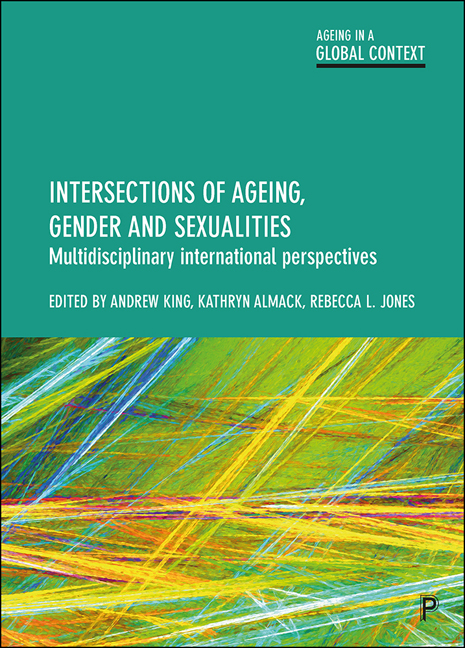Introduction
Published online by Cambridge University Press: 27 April 2022
Summary
This section, containing four chapters, explores the dynamics of power relationships concerning ageing, gender and sexualities within and across different contexts. The chapters consider how our different positionings and the intersections of different aspects of our identities can affect experiences and perceptions of dis/empowerment.
The first two chapters both draw on Bourdieu's concept of habitus. In Chapter Eight, ‘All change, please: education, mobility and habitus dislocation’ Jill Wilkens explores opportunities and practices presented through the education system in the 1940s, which held potential to transform the classed habitus of her respondents: lesbians and bisexual women born between 1940 and 1958. Wilkens draws on the Bourdieu's concept of habitus dislocation to expose the difficulties and ‘cost’ of social mobility. She argues that while social mobility can be aspirational and empowering, there are also costs associated with habitus dislocation which intersect with her respondents’ age, gender and sexual orientation. For some participants, the associated feelings of dislocation and ‘unbelonging’ have accompanied them all their lives and continue to shadow their later years.
In Chapter Nine, ‘Insider or outsider? Issues of power and habitus during life history interviews with menopausal Iranian women’, Elham Amini investigates the shifting power dynamics involved in conducting interviews with older women in Iran. Amini considers the tensions that arise from being both an insider and outsider. This resonates with Wilken's argument about positionings where one is caught between a number of social fields – creating multiple misalignments of dispositions and practices and a resulting sense of disequilibrium. Amini also highlights further fluidity in relation to different capitals and habitus, examining power shifts between interviewer and interviewee at different points in the interview.
The following two chapters address the rights of older lesbian, gay, bisexual and trans (LGBT) people in different contexts and settings. Chapter Ten, ‘Sexual expression and sexual practices in long-term residential facilities for older people’, by Feliciano Villar, explores the intersections between sexual expression and sexual practices alongside aging, gender and sexual diversity. Villar identifies how the sexual rights of older citizens might be curtailed in institutional care settings, deeply influenced by staff and institutional practices. The chapter then considers how sexual expression might be especially challenging among specific populations of older adults living in institutions, with particular attention being paid to people with dementia and LGBT residents.
- Type
- Chapter
- Information
- Intersections of Ageing, Gender and SexualitiesMultidisciplinary International Perspectives, pp. 117 - 118Publisher: Bristol University PressPrint publication year: 2019



